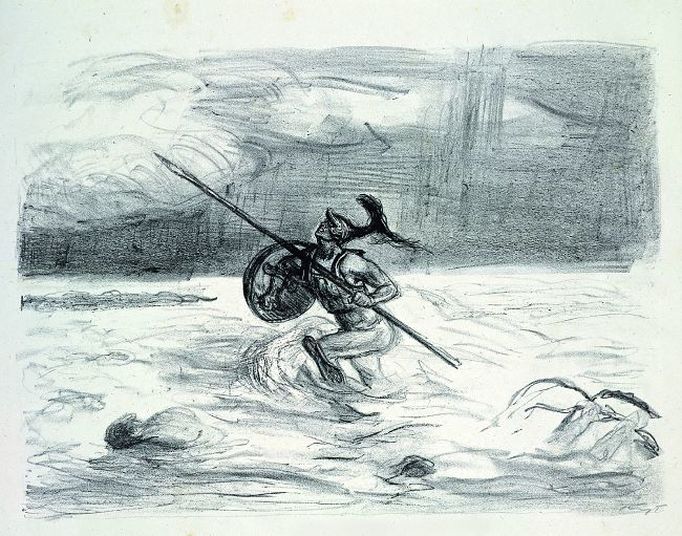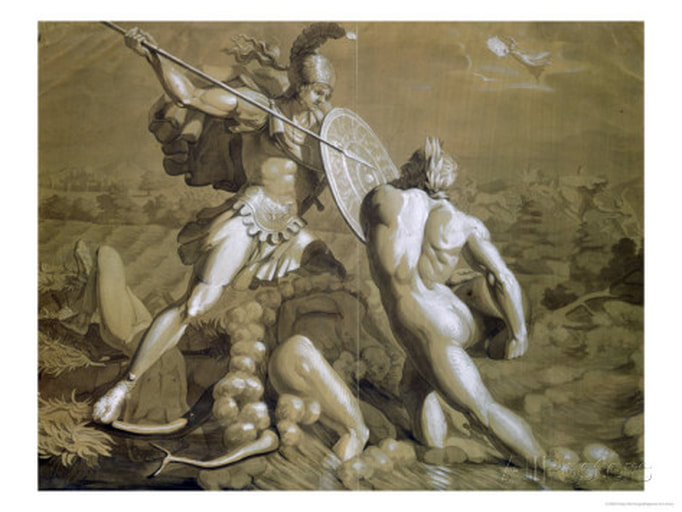THE POTAMOI SCAMANDER IN GREEK MYTHOLOGY
The pantheon of Ancient Greece is extremely large, containing many thousands of gods and goddesses, both major and minor deities. Today, only a relative few names of these Greek gods and goddesses are widely recognised, the likes of Zeus, Hermes and Apollo, but for every major deity there were a hundred minor ones, including the likes of Scamander.
Scamander in the Iliad
|
The names of the minor deities can be ascertained by looking at the surviving written sources from antiquity. One of the most famous sources of Greek mythology is Homer’s Iliad, and of course this tale has meant the names of many heroes are remembered today.
The Trojan War of course pitted the Achaeans under Agamemnon against Hector’s Trojans, but the gods and goddesses also took sides, with Ares and Apollo nominally on the side of Troy, and Hera and Athena on the side of the Greeks. Zeus forbade the most powerful gods from taking part in the fighting, although they occasionally did, but many of the minor deities took a more active role, and this is where Scamander comes to prominence. |
|
The Potamoi Scamander
Scamander was a Greek river god, a Potamoi, and therefore one of the 3000 sons of the Titans Oceanus and Tethys, and therefore Scamander was a brother of the 3000 Oceanids, the water nymphs. Each river in the ancient world would have a Potamoi associated with it, and this river god would live and die with the life of the river.
Scamander was therefore the Potamoi of the Scamander River, a river now known as Karamenderes, but this Potamoi was also known by the gods as Xanthos, and therefore gave his name to the Lycian city.
Scamander was therefore the Potamoi of the Scamander River, a river now known as Karamenderes, but this Potamoi was also known by the gods as Xanthos, and therefore gave his name to the Lycian city.
Scamander Marries
Despite there being 3000 Potamoi, very few played a prominent role in the stories of Ancient Greece, and indeed only a hundred of so are named in the ancient sources. The story of Scamander though, is one where the tale of the Potamoi is expanded upon.
Scamander would wed the nymph Idaia, a nymph associated with the springs of Mount Ida. Idaia would then give birth to Teucer, the first king of the area that would become Troy, indeed it was Teucer who was king when Dardanus came to the region.
Scamander would wed the nymph Idaia, a nymph associated with the springs of Mount Ida. Idaia would then give birth to Teucer, the first king of the area that would become Troy, indeed it was Teucer who was king when Dardanus came to the region.
Scamander and Achilles
|
The name of Scamander of course comes to the fore during the Trojan War, and it is perhaps no surprise that the Potamoi is considered one of the allies of the Trojans. Scamander can of course be considered an ancestor of King Priam, and the path of the Scamander River went through Troy and the region.
As war raged, arguments between the gods increased, and at one point Scamander faced off against Hephaestus, but it was later that Scamander really came to prominence. Achilles was in pursuit of a fleeing band of Trojans when they entered the Scamander River, Achilles followed them, but as he slew the Trojans, so Scamander decided to interfere. Now, Achilles was the greatest hero of the Achaean forces, but nevertheless it required the intervention of Poseidon and Athena, to rescue him from being drowned in the water of Scamander. Despite this brush with death, Achilles returned to action, and once again Scamander came to drown the Greek hero, this time Hephaestus came to rescue Achilles, and the god started to boil the waters of the river. This caused Scamander great pain, and to appease Hephaestus, Scamander would have to promise to not enter the fight on the side of the Trojans again. |
|
|
|

